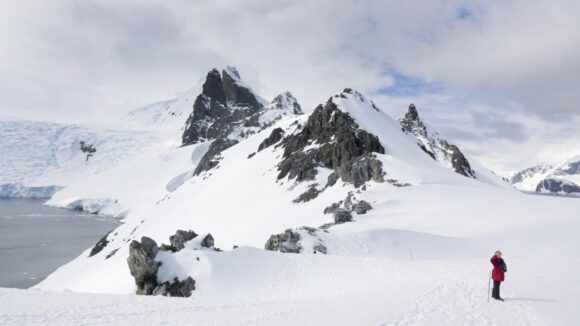Reading Cold People by Tom Robb-Smith for the Times, 14 January 2023
Harvard medical student Liza is on holiday in Lisbon with her parents and younger sister when gigantic alien fish-shapes descend from the sky and order all humans to vacate the habitable bits of their planet for Antarctica, the only continent humans have never been able to settle.
Twenty years on, in a ramshackle, endlessly retrofitted settlement on the Antarctic Peninsula called Hope Town, Liza — one of very few survivors — gives birth to Echo, a genetically engineered daughter whose modifications allow her to withstand the bitter cold. Echo is an early prototype of future human being designed in McMurdo City (the ramshackle, ice-bound, over-serious new capital of humanity) by the heroically unprincipled geneticist Song Fu, aided and abetted by her assistant Yotam Penzak, the book’s splendidly drawn antagonist. (The author of Child 44 knows how to tell a story; you know you’re in safe hands when your villain is motivated by love.)
Yotam, who attended her birth, thinks Echo and her posthuman kind are a worthy end in themselves: powerful and humane, capable of nurturing unengineered humanity in their impossible new environment, even as they succeed them over evolutionary time.
His boss disagrees. The remains of humanity will die out in not much more than a century, says Song Fu. A more radical succession is required if humans are to survive in any form.
Yotam’s unlucky love life leaves him vulnerable to browbeating by his boss, and then to seduction by Song Fu’s posthumous final creation, a Giger-esque melange of human, alligator and shark.
In this wasteland, “Eitan” and his kind are by far the dominant species — or will be, if Yotam lets them out of their cave.
Much as Roald Amundsen and his party consumed the husky dogs that had got him to the Pole in 1911, they will consume their human creators, not out of hate or revenge, but simply because they have no other use for them.
Can Yotam’s convictions be shaken? Can Eitan be stopped?
Cold People does not explore ideas; it animates them. Plot is king. Smith’s characters aren’t so much pretend people as they are admirable, animated types. The result is a page-turner that, without offering much by way of ordinary human feeling, reveals Tom Rob Smith’s view of the human condition: what he thinks about the plight of thinking, would-be ethical beings who still need to consume and burn and exploit in order to survive. In Smith’s vision, humanity’s reach so far exceeds its grasp that its downfall at its own hand seems more or less assured.
These are chewy and worthwhile themes, and Cold People cleverly distils them to the point where they play out, and reach a satisfying climax, at ordinary human scale. If Echo can protect her human family, there’s hope for humanity at large. If not, we’re all for the chum bucket.
Cold People will entertain and impress readers who enjoy novels that are containers for ideas. The rest of us may regret that Smith did not linger longer among the Polynesian navigators, seal hunters and stir-crazy researchers populating his largely irrelevant but wonderfully evocative prologue. Slow down, Smith! You were so set on your destination, you missed the scenery.

